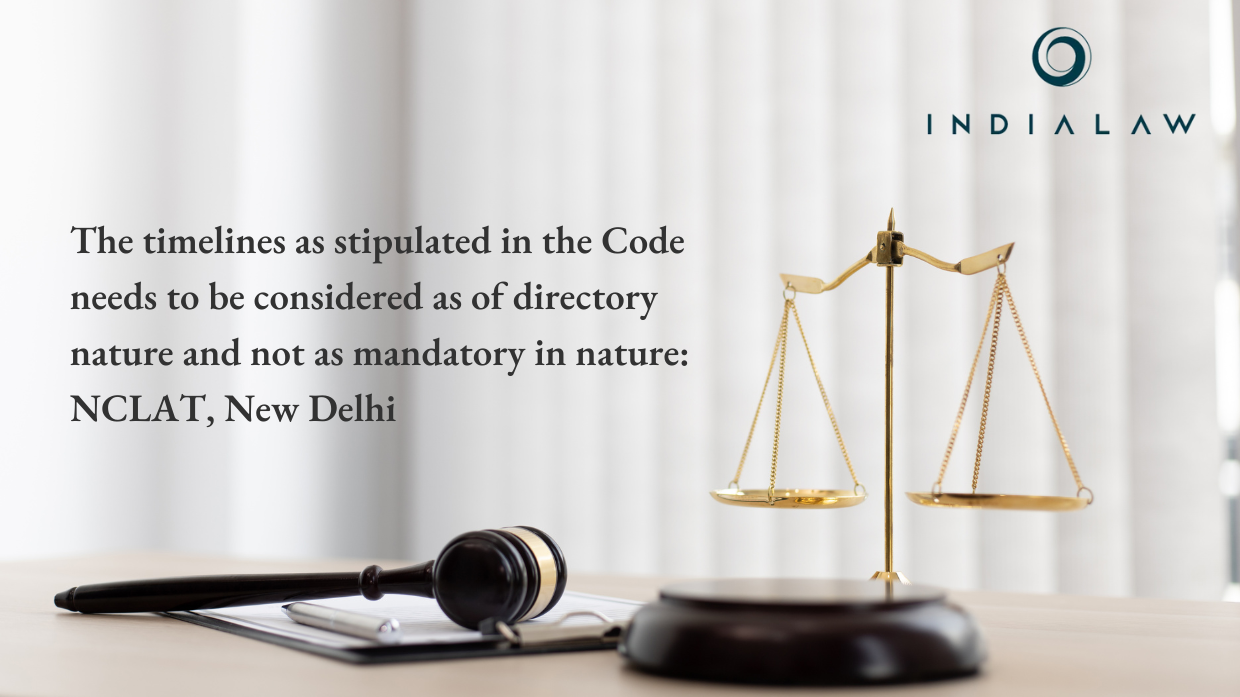The timelines as stipulated in the Code needs to be considered as of directory nature and not as mandatory in nature: NCLAT, New Delhi

Introduction:
In the matter of Vikram Laxman Pawar v. Sripatham Venkatasubramaniam Ramkumar, [i] the Hon’ble National Company Law Appellate Tribunal (NCLAT) held that the timelines established under the Insolvency and Bankruptcy Code should be regarded as directory rather than mandatory. The Tribunal was adjudicating an appeal filed against the Order dated 10.10.2023 passed by the Hon’ble NCLT, Mumbai, wherein the IA filed for admission of claims was dismissed.
Facts of the case:
The Appellant was a former employee of Privilege Industries Ltd, (hereinafter referred to as the Corporate Debtor). The Appellant was falsely implicated in a criminal case and was incarcerated from 03.09.2015 to 16.12.2016. During this period, the Corporate Debtor terminated his employment on 19.04.2016. After his release and acquittal of all charges by the Sessions Court in Satara on 16.12. 2016, the Appellant sought redress from the Labour Court. On 12.01.2023, the Labour Court ruled in his favour, ordering his reinstatement with back wages from 16.04.2016 onwards.
The Appellant informed the Corporate Debtor about the Labour Court’s Order dated 12.01.2023, through a letter sent on 06.02.2023. On 07.02.2023, the Corporate Debtor requested the Appellant to resume work immediately, but without awarding back wages from 16.04.2016, onwards.
The Corporate Debtor was admitted into the Corporate Insolvency Resolution Process (CIRP) vide Order dated 15.02.2023. On 20.02.2023, the Corporate Debtor sent a salary fixing letter to the Appellant, and on 10.05.2023, the Appellant again reminded them about his back wages as per the Labour Court’s order.
Upon admission of the Corporate Debtor vide Order dated 15.02.2023, the IRP issued Form ‘A’ as public announcement on 22.02.2023 for seeking claims against the Corporate Debtor. The limitation for filing claims before the IRP was set to expire on 21.05.2023. The Appellant filed his claim before the IRP, with a delay of approximately 46 days, on 05.07.2023. The said claim was rejected by the IRP on grounds of delay in filing vide letter dated 18.07.2023.
The Appellant filed an application before the Adjudicating Authority for admission of his claims, which was dismissed by the Hon’ble NCLT vide its Impugned Order dated 10.10.2023. Subsequently, SNJ Breweries Private Limited emerged as the Successful Resolution Applicant and the Resolution Plan was approved by the Hon’ble NCLT.
Decision Of The NCLAT:
The Hon’ble NCLAT observed that the Resolution Professional (RP) was aware of the Appellant’s claims and the court orders in his favour for reinstatement in the Corporate Debtor with back wages. The Appellant had consistently pursued his claims with the Corporate Debtor prior to the commencement of the CIRP and continued to engage with the Respondent regarding his back wages.
The NCLAT recognized that there was a delay on the part of the Appellant in filing his claims. Despite this, the Respondent compiled a list of creditors after receiving the Appellant’s claim but did not admit the claim, even though they were aware of it. This demonstrated that the Respondent had full knowledge of the Appellant’s claims and the specific amounts involved even before the formation of the list of creditors.
The NCLAT pointed out that while the Appellant did not file his claims within the 90-day period specified under Regulation 12 of the CIRP Regulations, 2016, the Respondent also failed to verify claims within seven days of the last date of receipt, as required by Regulation 13 of the CIRP Regulations.
The NCLAT compared the present appeal with the case of M/s RPS Infrastructure Ltd. vs. Mukul Kumar & Anr. [(2023) 10 SCC 718], distinguishing the facts, as the Appellant in the present case had been pursuing his claims regularly and filed them well before the approval of the Resolution Plan by the Committee of Creditors (CoC) and the Adjudicating Authority. In contrast, in M/s RPS Infrastructure Ltd., the claims were filed after the CoC had approved the plan.
The NCLAT further emphasized the RP’s duty under Section 18 of the Code to collate claims and held the timelines under the Code to be directory rather than mandatory in nature. The NCLAT ruled in favour of the Appellant, determining that he had established sufficient grounds for his claim to be considered.
Accordingly, the Hon’ble NCLAT set aside the impugned order dated 10.10.2023 passed by the Hon’ble NCLT and remanded the matter back to the Adjudicating Authority for further proceedings.
Conclusion:
The ruling in Vikram Laxman Pawar v. Sripatham Venkatasubramaniam Ramkumar underscores the nuanced balance required in insolvency proceedings. While timelines are crucial, the National Company Law Appellate Tribunal (NCLAT) emphasized the Resolution Professional’s duty to diligently consider all claims, even those filed beyond stipulated periods. By deeming timelines as directory rather than mandatory and prioritizing equitable treatment of stakeholders, the NCLAT’s decision sets a precedent for fair and inclusive resolution processes. This case highlights the importance of upholding principles of natural justice and ensuring due diligence in handling insolvency cases, ultimately contributing to the credibility and efficacy of the insolvency framework.
[i] Comp. App. (AT) (Ins) No. 1537 of 2023 & I.A. No. 5520, 5521 of 2024
By entering the email address you agree to our Privacy Policy.



